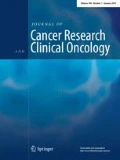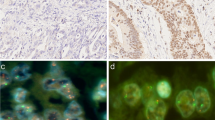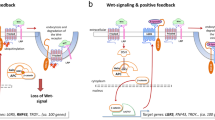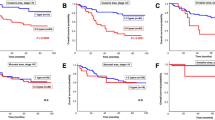Abstract
Several studies have reported conflicting results regarding correlations of the loss of Fhit expression with clinicopathological parameters in gastric cancer. We investigated the immunohistochemical expression of Fhit in 362 cases of sporadic advanced gastric adenocarcinoma. The series included 64 cases with microsatellite instability associated with defective mismatch repair genes. Fhit expression resulted absent in 72% of the tumors analyzed. Absence of Fhit expression was more frequent in cases with diffuse and mixed histotype compared to the intestinal histotype (P=0.009). Absence of Fhit expression also correlated with tumor stage (P<0.001), lymph node involvement (P<0.001), presence of distant metastasis (P=0.033), and increasing histological grade (P=0.005). Retained Fhit expression also correlated with microsatellite instability as 61% of instable tumors had lost Fhit expression compared to 74% of microsatellite stable cancers (P=0.050). While loss of Fhit correlates with poorer survival in univariate analysis, it is not an independent prognostic factor in multivariate analysis and is thus not of clinical utility.


Similar content being viewed by others
References
Baffa R, Veronese ML, Santoro R et al (1998) Loss of FHIT expression in gastric carcinoma. Cancer Res 58:4708–4714
Barnes LD, Garrison PN, Siprashvili Z et al (1996) Fhit, a putative tumor suppressor in humans, is a dinucleoside 5’,5”‘-P1,P3-triphosphate hydrolase. Biochemistry 35:11529–11535
Capuzzi D, Santoro E, Hauck WW et al (2000) Fhit expression in gastric adenocarcinoma: correlation with disease stage and survival. Cancer 88:24–34
Chen YJ, Chen PH, Lee MD et al (1997) Aberrant FHIT transcripts in cancerous and corresponding non-cancerous lesions of the digestive tract. Int J Cancer 72:955–958
Croce CM, Sozzi G, Huebner K (1999) Role of FHIT in human cancer. J Clin Oncol 17:1618–1624
Gemma A, Hagiwara K, Ke Y et al (1997) FHIT mutations in human primary gastric cancer. Cancer Res 57:1435–1437
Hermanek P, Sobin L (1992) TNM classification of malignant tumours, UICC, 2nd revision. Springer, Berlin Heidelberg New York
Huiping C, Kristjansdottir S, Bergthorsson JT et al (2002) High frequency of LOH, MSI and abnormal expression of FHIT in gastric cancer. Eur J Cancer 38:728–735
Ishii H, Dumon KR, Vecchione A et al (2001) Effect of adenoviral transduction of the fragile histidine triad gene into esophageal cancer cells. Cancer Res 61:1578–1584
Ishii H, Zanesi N, Vecchione A et al (2003) Regression of upper gastric cancer in mice by FHIT gene delivery. Faseb J 17:1768–1770
Kawaguchi K, Yashima K, Koda M et al (2004) Fhit expression in human gastric adenomas and intramucosal carcinomas: correlation with Mlh1 expression and gastric phenotype. Br J Cancer 90:672–677
Kitamura A, Yashima K, Okamoto E et al (2001) Reduced Fhit expression occurs in the early stage of esophageal tumorigenesis: no correlation with p53 expression and apoptosis. Oncology 61:205–211
Lauren P (1965) The two histological main types of gastric carrcinoma: diffuse and so called intestinal-type carcinoma. An attempt at a histo-clinical classification. Acta Pathol Microbiol Scand 64:31–49
Lee HS, Lee HK, Kim HS et al (2003) Tumour suppressor gene expression correlates with gastric cancer prognosis. J Pathol 200:39–46
Lee SH, Kim CJ, Park HK et al (2001) Characterization of aberrant FHIT transcripts in gastric adenocarcinomas. Exp Mol Med 33:124–130
Lee SH, Kim HY, Kim TJ et al (2002) Aberrant splicing of FHIT transcripts in human gastric cancer cell lines. Res Commun Mol Pathol Pharmacol 112:39–49
Lee SH, Kim WH, Kim HK et al (2001) Altered expression of the fragile histidine triad gene in primary gastric adenocarcinomas. Biochem Biophys Res Commun 284:850–855
Negrini M, Monaco C, Vorechovsky I et al (1996) The FHIT gene at 3p14.2 is abnormal in breast carcinomas. Cancer Res 56:3173–3179
Noguchi T, Muller W, Wirtz HC et al (1999) FHIT gene in gastric cancer: association with tumour progression and prognosis. J Pathol 188:378–381
Ohta M, Inoue H, Cotticelli MG et al (1996) The FHIT gene, spanning the chromosome 3p14.2 fragile site and renal carcinoma-associated t(3;8) breakpoint, is abnormal in digestive tract cancers. Cell 84:587–597
Rocco A, Schandl L, Chen J et al (2003) Loss of FHIT protein expression correlates with disease progression and poor differentiation in gastric cancer. J Cancer Res Clin Oncol 129:84–88
Sarli L, Bottarelli L, Azzoni C et al (2004) Abnormal Fhit protein expression and high frequency of microsatellite instability in sporadic colorectal cancer. Eur J Cancer 40:1581–1588
Skopelitou AS, Mitselou A, Katsanos KH et al (2003) Immunohistochemical expression of Fhit protein in Helicobacter pylori related chronic gastritis, gastric precancerous lesions and gastric carcinoma: correlation with conventional clinicopathologic parameters. Eur J Gastroenterol Hepatol 15:515–523
Sorio C, Baron A, Orlandini S et al (1999) The FHIT gene is expressed in pancreatic ductular cells and is altered in pancreatic cancers. Cancer Res 59:1308–1314
Sozzi G, Veronese ML, Negrini M et al (1996) The FHIT gene 3p14.2 is abnormal in lung cancer. Cell 85:17–26
Stec-Michalska K, Antoszczyk S, Klupinska G et al (2005) Loss of FHIT expression in gastric mucosa of patients with family histories of gastric cancer and Helicobacter pylori infection. World J Gastroenterol 11:17–21
Tamura G, Sakata K, Nishizuka S et al (1997) Analysis of the fragile histidine triad gene in primary gastric carcinomas and gastric carcinoma cell lines. Genes Chromosomes Cancer 20:98–102
Vecchione A, Sevignani C, Giarnieri E et al (2004) Inactivation of the FHIT gene favors bladder cancer development. Clin Cancer Res 10:7607–7612
Zanesi N, Fidanza V, Fong LY et al (2001) The tumor spectrum in FHIT-deficient mice. Proc Natl Acad Sci USA 98:10250–10255
Acknowledgements
Emma Bragantini and Stefano Barbi contributed equally. This work was supported by: Fondazione Cassa di Risparmio di Verona (Bando 2004) to P.S. Moore; Associazione Italiana Ricerca sul Cancro (AIRC), Milan, Italy to G. de Manzoni; CNR and MIUR, Rome, Italy to Aldo Scarpa and Franco Rovielle.
Author information
Authors and Affiliations
Corresponding author
Rights and permissions
About this article
Cite this article
Bragantini, E., Barbi, S., Beghelli, S. et al. Loss of Fhit expression is associated with poorer survival in gastric cancer but is not an independent prognostic marker. J Cancer Res Clin Oncol 132, 45–50 (2006). https://doi.org/10.1007/s00432-005-0045-9
Received:
Accepted:
Published:
Issue Date:
DOI: https://doi.org/10.1007/s00432-005-0045-9




